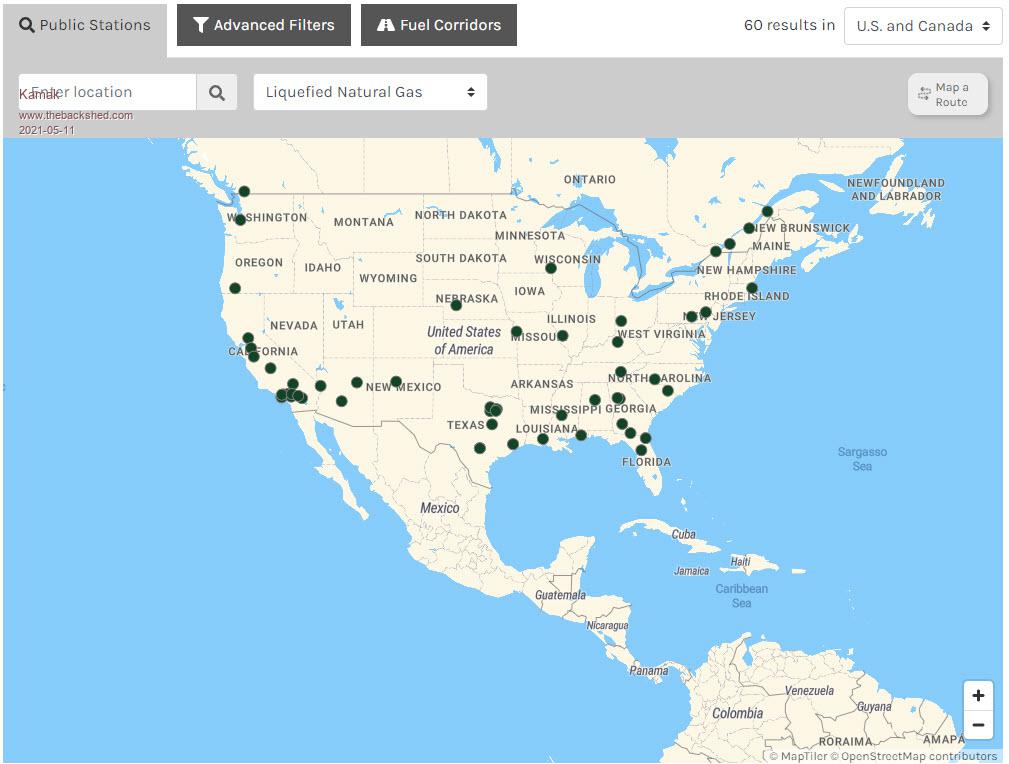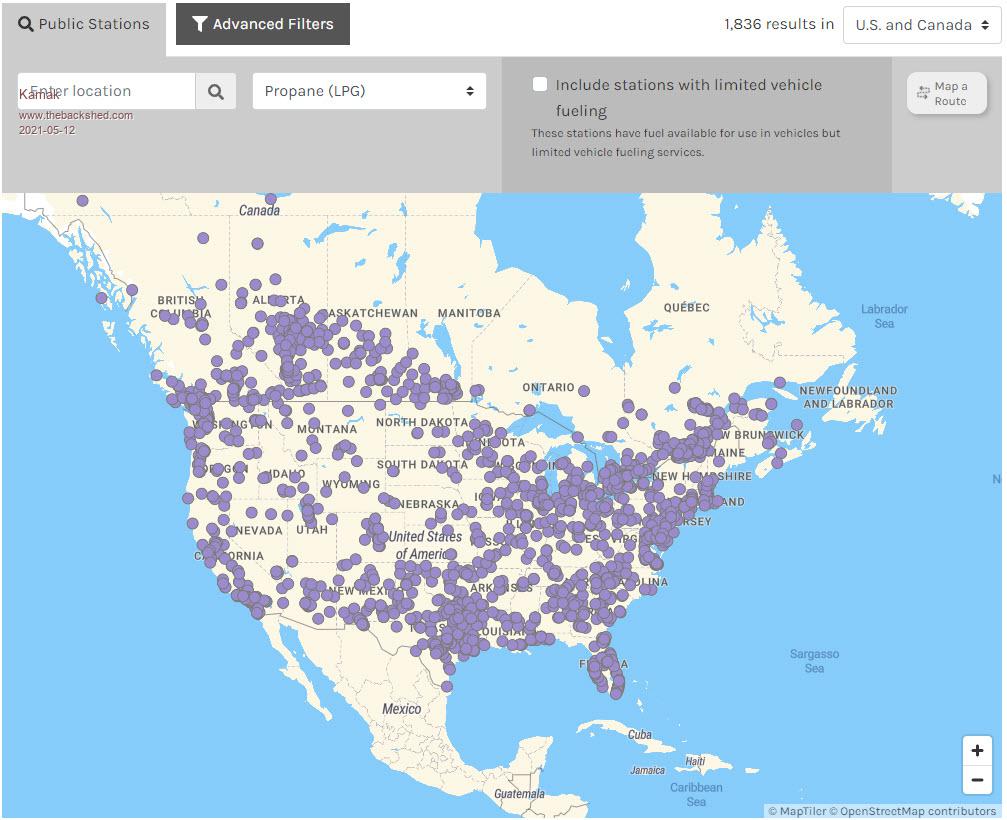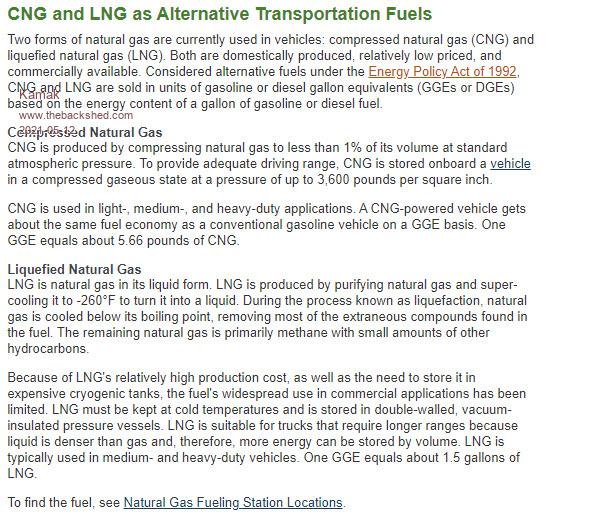
|

|
Forum Index : Electronics : Turning a Toyota Prius into a "portable" generator
| Author | Message | ||||
| Kamak Senior Member Joined: 13/04/2021 Location: CanadaPosts: 150 |
Well, we're in NA. There are not many LNG stations around, but they do exist. "Natural gas costs significantly less than gasoline or diesel per gallon. For example, the average pump price at utility compressed natural gas stations was $2.37 per gallon in February, whereas the average cost of gasoline in California was $3.24 per gallon, and the average cost of diesel was $3.73 per gallon, according to the Energy Information Administration."  https://afdc.energy.gov/stations/#/find/nearest?fuel=LNG |
||||
| Warpspeed Guru Joined: 09/08/2007 Location: AustraliaPosts: 4406 |
Compressed natural gas is always still a gas. Liquefied natural gas (butane or propane) is sold as a liquid. The two are a very different. Edited 2021-05-11 16:01 by Warpspeed Cheers, Tony. |
||||
| Solar Mike Guru Joined: 08/02/2015 Location: New ZealandPosts: 1138 |
Back in the nineties I used to own an old 4 cyl 1600cc car that ran on compressed natural gas. At the time there were a number of high pressure filling stations around setup like petrol pumps. A large very thick steel tank fitted in the boot, with a gas line running to engine and filling valve under the bonnet. Standard carb was fitted with an extra venturi device between the carb and air cleaner with gas input from regulator and solenoid valve. Ignition was fitted with an auto spark advance unit that switched on when running on natural gas. Manual changeover switch on the dash allowed switching from petrol to Gas at will. Usually start the car on petrol then switch to Gas, didn't have as much power on the road as petrol, going up a steep hill one would switch back to petrol for some extra grunt. Had a range of 100kms, not a problem as you could flick the switch and run on petrol when it ran out. See none of that now, there are no filling stations anywhere, few LPG ones exist with some cars running on that, mainly taxis. Cheers Mike |
||||
| Kamak Senior Member Joined: 13/04/2021 Location: CanadaPosts: 150 |
In NA, those filling stations are liquid natural gas, not LPG (propane). Propane is sold in a lot more retail stations. I'm pretty sure those LNG stations are for commercial fleets. LNG is real high-pressure Liquid Natural Gas and is not liquid propane LPG or butane. The LNG tanks in vehicles here are high compression liquified natural gas tanks LNG. Taxis in North America still do or did a lot of fleets on LNG, LPG, and now electric. This is the LPG Propane map of NA. Much more, obviously. https://afdc.energy.gov/fuels/natural_gas_locations.html#/find/nearest?fuel=LPG  Edited 2021-05-12 01:09 by Kamak |
||||
| Kamak Senior Member Joined: 13/04/2021 Location: CanadaPosts: 150 |
On second look, you're probably right about the inference that "most" vehicles use CNG as opposed to LNG, as this additional information states that, for the most part, the LNG here in NA is for medium to large trucks going long distances. Taxis must be using CNG. Not to say we couldn't get our hands on LNG for I.C.E. generators. Cheaper: Fuelling up with LNG costs about 40 percent less than diesel.  https://www.tranbc.ca/2012/07/17/cast-of-b-c-players-fuelling-natural-gas-trucks/ Edited 2021-05-12 07:20 by Kamak |
||||
| Warpspeed Guru Joined: 09/08/2007 Location: AustraliaPosts: 4406 |
Propane is cheaper than petrol (gasoline) too, but all the costs are distorted by road tax. Natural gas as it comes out of the pipe to suburban homes is incredibly cheap for the energy content. Its the cost of the electrical power to compress it is where the money goes. The government also do not like the idea of not being able to tax it. Insurance companies and the fire brigade do not like the idea of fires and explosions caused by people trying to compress it at home themselves. So basically the Australian Government do not want to know about do it yourself compressed natural gas. It would be possible to do with a repurposed scuba tank compressor, but it takes a lot of Kw and a lot of hours to fill a tank large enough for a days driving. As I said earlier, a straight electric vehicle is much more practical and energy efficient, and probably overall safer. Cheers, Tony. |
||||